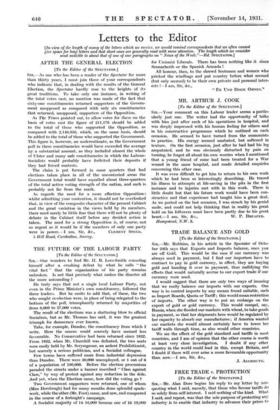Letters to the Editor
[In view of the length of many of the letters which we receive, we would remind correspondents that we often cannot give space for long letters and that short ones are generally read with more attention. The length which we consider most suitable is about that of one of our paragraphs on " News of the Week."—Ed. SPECTATOR.]
AFTER THE GENERAL ELECTION
[To the Editor of the SPECTATOR.] SIR,—As one who has been a reader of the Spectator for more than thirty years, I must join those of your correspondents who indicate that, in dealing with the results of the General Election, the Spectator hardly rose to the heights of its great traditions. To take only one instance, in writing of the total votes cast, no mention was made of the fact that sixty-one constituencies returned supporters of the Govern- ment unopposed as compared with only six constituencies that returned, unopposed, supporters of the Opposition.
As The Times pointed out, to allow votes for these on the basis of votes cast the figure of 211,170 should be added to the total of those who supported the Opposition, as compared with 2,146,956, which, on the same basis, should be added to the total of those who supported the Government. This figure is, however, an underestimate, as the Government poll in these constituencies would have exceeded the average by a substantial amount, as they included almost the whole of Ulster and many safe constituencies in which the Labour- Socialists would probably have forfeited their deposits if they had forced contests.
The claim is put forward in some quarters that had elections taken place in all of the uncontested areas the Government total would have equalled about three-quarters of the total active voting strength of the nation, and such is probably not far from the mark.
As regards the need for a more effective Opposition ; whilst admitting your contention, it should not be overlooked that, in view of the composite character of the present Cabinet and the great variation in the views held by its members, there need surely be little fear that there will not be plenty of debate in the Cabinet itself before any decided action is taken. The need for a strong Opposition is, of course, not so urgent as it would be if the members of only one party


































 Previous page
Previous page